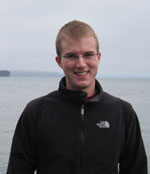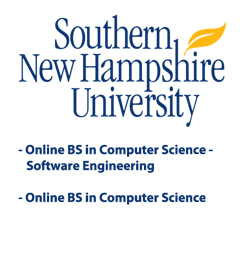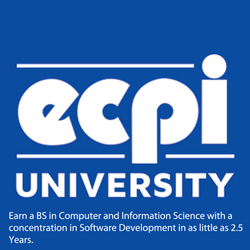
UMD’s Computer-Science Program Leads to Exciting Career Prospects Post-College, Says Alum Calvin GrunewaldBy Rick Docksai 
Grunewald excels programming as well as on the track. ~ Facebook Game Day 2012 Microsoft and Facebook—two of the most well-known and successful companies in America. University of Maryland graduate Calvin Grunewald scored high-earning jobs at both while fresh out of college, thanks to his degree in computer science. And he considers himself no exception: Graduates of computer science and its sister discipline, software engineering, will never lack job security in today’s economy, he says. “If you want to maximize your chances of getting a job, getting a degree in computer science or software engineering, it’s probably the best thing you can do,” he says. “Microsoft and Facebook are interviewing people left and right because there is so much to do. It’s almost ludicrous how many jobs are available out there, and there are never enough people for them.” The Path to MicrosoftIn spring 2008, then-sophomore Grunewald heard from his faculty advisor about a great internship opportunity at Microsoft’s Seattle division. He applied, got in, and liked it so much that he applied for another internship the following summer at another Microsoft division. They liked him, too, and gave him a full-time job offer—conditional only upon his completing his degree program at UMD. “All I had to do was graduate, at that point, and then I could move back to Seattle and work at Microsoft,” he says. As promised, Microsoft hired him. He proceeded straight from his May 2010 graduation from UMD to commence work as a Microsoft software-development engineer. “Microsoft and Facebook are interviewing people left and right because there is so much to do. It’s almost ludicrous how many jobs are available out there, and there are never enough people for them.” ~ Grunewald
It proved to be an intensive education in how businesses use software day-to-day. Grunewald knew that he could move on from here to any of thousands of businesses around the country—any one of them could put his Microsoft-obtained product know-how to great use. Less than two years later, another company did bring him on board: Facebook. Facebook’s Culture of BuildersMany young people, in their first few years of career life, feel like the proverbial cogs in the machine. They follow orders, rarely question them, and even more rarely (if ever) give them. Other higher-ups decree their places, their responsibilities, and their activities. Soon after being hired in January 2012 to Facebook’s team of software engineers, however, Grunewald realized that it would be a wholly different experience. Here, his opinion would matter, and he would have broad freedom to exercise his creativity as he saw fit. “At the end of the day, it’s the engineers who are making decisions on new products,” he says. “It’s very much a culture where engineers have free reign to go and do what they want.” 
Calvin Grunewald is not lacking job security in today's economy. His current role is developing “integration” software that third-party companies such as Farmville or Pinterest use to upload ads or apps of their making onto Facebook. Ads and apps are how Facebook makes its money, so he directly impacts whether the company’s profits rise or fall. It may be a lot of pressure, at times. It’s certainly hard work. Grunewald occasionally gets called up to participate in a “hack-a-thon,” an all-day—and, if need be, all-night—get-together of all the software engineers to review Facebook’s products and improve them. If Grunewald or another engineer sees something in a product that they don’t like, they can alert the other hack-a-thoners, and together they will devise code that will fix it. Grunewald speaks with great satisfaction about getting to directly improve the apps that people all across the planet use. “It’s very much a culture where engineers have free reign to go and do what they want.” ~ Grunewald
“I find it to be very interesting, very high-impact, and I’m happy to be coming to work every day and working on the things I’m working on,” he says. The UMD Training GroundGrunewald is clearly pleased with his career life post-college. He’s also grateful to UMD’s computer-science program, as the training it gave him made his present-day career successes possible. Grunewald’s UMD coursework included classes that stressed the theoretical, such as mathematical, proof-heavy instruction in algorithms; along with practical courses that instructed in how to write and program code to solve a wide range of problems. Other courses incorporated both theory and practical problem solving, such as classes in database systems and operating systems. Grunewald says that the programming component is most relevant to what he does today. He routinely draws from those classroom exercises in writing code to design and re-design the Facebook Web system and the apps, pages, and services that run on it. And it’s not just Facebook; Grunewald says that those university programming lessons would serve a graduate well at just about any software-engineering role with any company in today’s world. “The top-tier companies are looking for smart and driven individuals who know how to design systems and write efficient code to solve tough problems,” he says. Grunewald adds, however, that the computer-science program’s best opportunities lay outside the classroom. Independent-study arrangements, internships, co-ops, and faculty-led research projects abounded, and each enabled its student participants to put what they had learned in class into practice. And of course, they led quite a few students to their first post-college jobs. “As long as the students are willing, they can land great internships and great jobs,” he says. Some Challenges, Many RewardsA degree in computer science or software engineering isn’t for everyone. For one thing, it’s best if you’re a math person. Grunewald had to take many calculus and math-related theory courses on the way to his degree, and he acknowledges that if you struggle with math, you might find it intimidating. “The top-tier companies are looking for smart and driven individuals who know how to design systems and write efficient code to solve tough problems,” he says.
“Programming requires you to think differently. You have to learn another language, and the language is mathematics,” he says. Fabulous career prospects await you if you see it through, though. You can find work in practically any business of your choosing. Or you could start a business of your own! Grunewald notes that whereas the business-startup costs of buying machinery and warehouses to make and store physical products costs tens of thousands of dollars or more, creating and storing products in software costs nothing. “You essentially get to build whatever you want." ~ Grunewald says |



